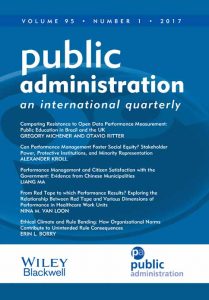American Public Libraries: A Forgotten Social Institution?
Last week, NPR ran a series on American public libraries. The series immediately filled me with a sentimental wave of nostalgia. One of my earliest memories is packing up my teddy bear and a sack lunch and driving to the Lincoln Township Public Library for their annual Teddy Bear Picnic. I also remember taking a writing workshop at the library in second or third grade, which lead to my first publication, “Friends of the Sea.” As an undergraduate, I spent countless hours at the Harold Washington Library in Chicago studying or perusing the library’s extensive collection of foreign films. And a staff member at the Boston Public Library in Copley Square helped me navigate the IRS website when income tax forms first transitioned from a paper to online format.
The NPR series was more than just interesting. It led me to start to think about the ways the public library has been important in my life. In addition, I started to consider what libraries teach all of us about functioning in society. Are public libraries a hidden social institution?
Today, sociologists say often say “social institution” when describing social bodies such as governments, the family, universities, corporations, or medical and legal systems. My undergraduate Introduction to Sociology textbook, Society: The Basics, stated that a social institution is “a major sphere of social life, or societal subsystem, organized to meet human needs” (Macionis 2006:480).
Talcott Parsons’ argued that every social system was a collection of independent parts, which needed to be integrated. He suggested the family was the primary institution that introduced individuals to society. However, he was open to the ways in which other institutions contributed to this process. Educational institutions, religious institutions and civic institutions all can contribute to the ways in which we learn to function within the contexts of society. Each teaches us a variety of ways to maneuver through the social world. But what about that building in every community with the massive collection of books where they teach you not to speak above a whisper?
For me, the library was clearly a major sphere of social life and taught me numerous lessons necessary for functioning well in society. It was more than just a place to find old maps and books or fill my need for print based knowledge. At the library I learned what culturally acceptable behaviors to use within public spaces. I made friends. I took workshops. I thumbed through French newspapers and magazines. And I attended numerous lectures and concerts. At Harold Washington I could even “checked out” a rehearsal room with a piano for a few hours.
After Hurricane Sandy, public libraries on the east coast provided heat, electricity, internet service, and entertainment to thousands of displaced patrons and community members, illustrating the role of public spaces in times of disaster. However, except in times of emergency few people think of the public library as a critical public service provider, let alone a social institution.
So, libraries have become creative. In a digital age, more and more public libraries are expanding their collection of e-books. The Department of Environmental Conservation has been working with public libraries on a fishing pole lending program, which provides library patrons with access to the equipment and informational material for periods up to three weeks. For a number of years, gaming nights for teens has been popular at public libraries. The Portland Public Library has been offering games for check out since 2010.
American public libraries have also been a key player in attempting to close the digital divide (Becker et al. 2012; Bertot et al. 1994). This is critical, as scholars have found that access and ability to function in a digital society is greatly impacted by social class, gender and age (Hull 2003). In this regard, library staff have taken on new roles as teachers, mentors, and even activists often helping individuals who do not have resources to access alternative means of gaining the skills needed in today’s society.
I wonder what Andrew Carnegie would think of terming public libraries as a social institution? His $60 million fund for the construction of libraries across the country provided millions of Americans a necessity resource he believed was equivalent to civic buildings, schools, and police stations. Would he agree that the public library today is a major part of social life that continues to meet our many of our societal needs? I believe he would, even if we (as community members) tend to overlook this important social institution.
Further Reading:





1756-2589/asset/NCFR_RGB_small_file.jpg?v=1&s=0570a4c814cd63cfaec3c1e57a93f3eed5886c15)
1728-4457/asset/PopulationCouncilLogo.jpg?v=1&s=03074651676b98d6b9d0ef1234bd48fe7ff937c3)
1 Response
[…] American Public Libraries: A Forgotten Social Institution? […]